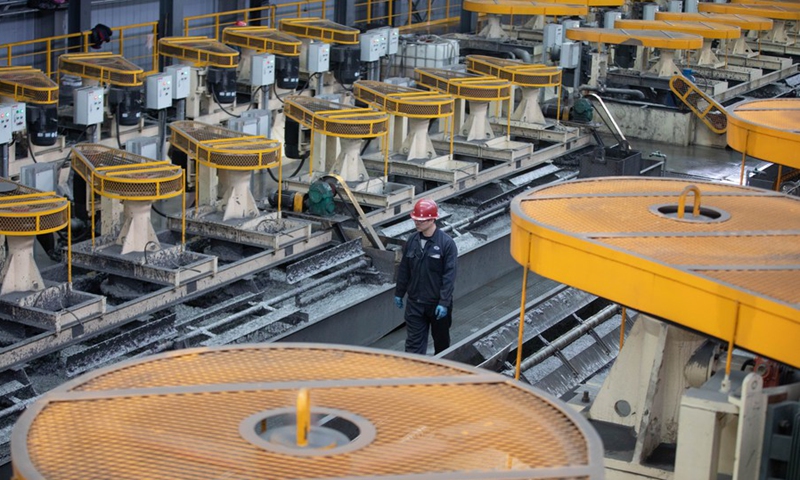
A man works in a workshop of a graphite company in Jixi City, northeast China's Heilongjiang Province, March 24, 2023. Photo: Xinhua
As Japan announced plans on Wednesday to launch an anti-dumping investigation into graphite electrodes imported from China, Chinese experts and industry insiders said on Thursday that the move may be a case of the Asian country following US' footsteps in containing China, which will not only hinder Japan's industrial development in the long term but also affect regional cooperation.
On February 26, Japan's Ministry of Finance received an application from SEC Carbon, Tokai Carbon and Nippon Carbon to impose an anti-dumping duty on graphite electrodes originating in China, according to a notice released by the ministry.
The Japanese Ministry of Finance and Ministry of Economy, Trade and Industry claimed on Wednesday that they found that the application had sufficient evidence to justify the initiation of an investigation.
"The investigation is to be concluded within one year, in principle. The ministries will provide opportunities for interested parties, including suppliers in China, and domestic producers and importers of graphite electrodes, to present evidence, while carrying out a factual investigation," read the notice.
China is the world's largest graphite exporter. Graphite electrodes are mainly used for steelmaking in electric arc furnaces and are currently the only material with high electrical conductivity that can withstand the extremely high heat in electric arc furnaces.
"Ostensibly, this move is an anti-dumping investigation aimed at graphite electrodes imported from China. But amid the so-called economic security policy mainly promoted by the US and Japan, the investigation is probably in line with the US policy of suppressing China's technological development," Xiang Haoyu, a research fellow at the China Institute of International Studies, told the Global Times on Thursday.
Xiang noted that the uncertainty during the investigation will cast a cloud over the cooperation prospects between the enterprises of China and Japan.
"Once Japan determines that there is anti-dumping dumping behavior in China and takes relevant anti-dumping measures, bilateral trade and economic cooperation is bound to be affected," Xiang warned.
As China and Japan are the two leading players in the Asia-Pacific region, Japan's move is negative for regional economic and trade cooperation, Xiang said.
Wu Chenhui, an independent industry analyst, told the Global Times that in the long term, Japan's related industries will be hurt by high costs.
As to whether the Japanese government will decide to launch anti-dumping policies, Wu said that it is up to whether Japan's domestic production can be realized as a substitute for Chinese imports.
"The political demand to 'decouple' is unstoppable, and Japan will cooperate with the US and its Western alliance as long as its own resources allow," Wu noted.
Behind many of the "trade disputes," there are political and security factors. "If we look at it purely from the economic and trade fields, there is no need to make excessive interpretations, and we can also wait and see what will happen," Xiang stressed.




